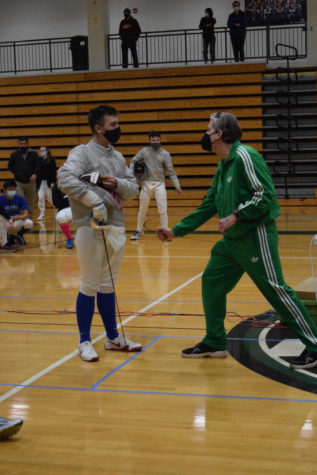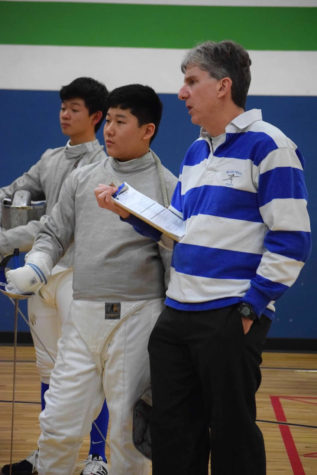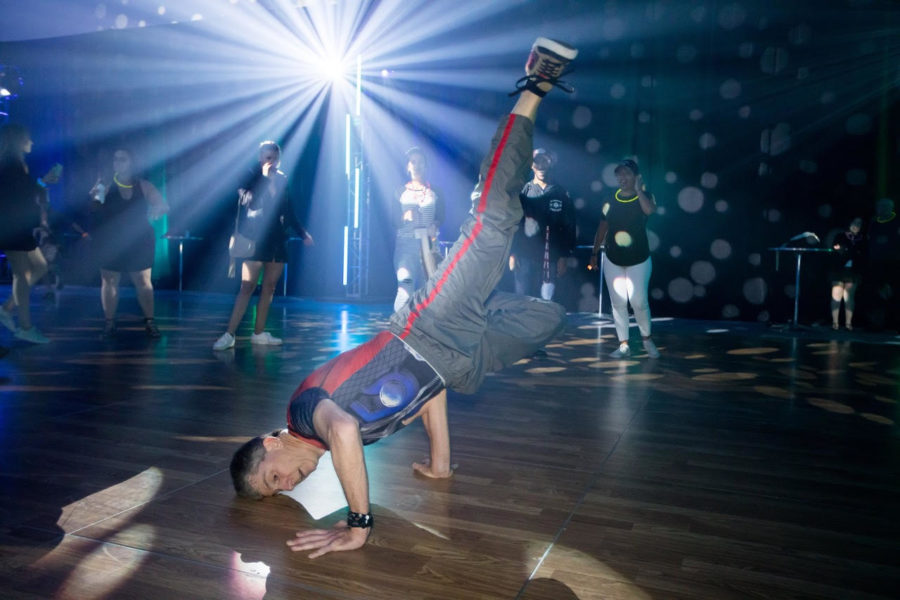Harold Buck has been a common topic among students the past year due to his increasing popularity from dancing in class.
He first “caught the wave of suburban breaking in 1984.” Buck continues, “[I] did it for nine months and had fun with it, but it was kind of a dead end because no one back then would teach you anything. I spent about 10 years from like age 40 – 50 watching dance shows on TV, and thinking ‘oh that would be really fun to do but I’m too old for that,’” he explains. He eventually joined an adult breaking class, “and I was hooked. I all of a sudden realized I could look up on YouTube dance tutorials and I started doing that. I’ve done something like 85 battles, probably would’ve been more if not for COVID.” He doesn’t just limit himself to one style of dance, he’s currently practicing “breaking, locking, wacking, popping, hip-hip, house, crump, tutting, and animating.”
Buck can often be seen dancing while subbing, but he has also been coaching fencing for 22 years. His start in fencing proves that passions are discovered and not born with. He explains, “I certainly like fencing, but I took kind of a strange path to it, we didn’t have fencing in high school and I didn’t do it in college.” He joined the University of Minnesota’s club fencing team while in graduate school and “then took the saber class as a P.E. class just for fun.”

ship at Holy Family. (Submitted by: Harold Buck)
His favorite aspect of fencing is “the way in which you can outsmart people, [which] is probably greater [in fencing] than in most sports. Your ability to analyze what’s going on, come up with a plan, and execute can allow you to beat people who are maybe more physically gifted than you are. My favorite moments from my fencing career have been moments when I’ve outsmarted somebody else rather than just beating them with brute force.”
After finishing his program, Buck asked his instructor if he needed any help. He then became an assistant coach and he truly found his passion. Buck explains, “[I’ve] always been interested in teaching and coaching, so I think fencing works well with my skill set for coaching, and I enjoy fencing because of that.” He continues, “It’s not as much a passion for fencing, it’s a passion for coaching.”
The multifaceted Buck explains that he doesn’t just involve himself with his well established passions of coaching, fencing, and dancing, but is also involved with a large number of outside activities including, “[officiating] high school and college lacrosse, I assign officials for lacrosse, I ocean lifeguard in the summer, I do some private tutoring, I do some online consulting, I kind of put together a package of stuff I like doing to keep things interesting.”

All these activities have proved useful and applicable to other aspects of his life. Buck realized that he, or any person, could improve at anything by just giving it time and effort. He explains, “I went to a Quaker high school in Pennsylvania and we were forced to do, whether you wanted to or not, two sports a year. I picked cross country because that seemed like it was the easiest to do, I could hide in the back, and I was 31 out of 32 people on the team when we started, and I kept getting better and better and [by] Senior year, I was the fourth man on varsity.
Translating this concept of improvement and inexperience to his fencers, Buck never fails to encourage others to try something fresh and unexpected for themselves to learn they can improve at anything. He adds, “You can show up at high school, never even having fenced, and come out and learn to fence and have a good experience. I really like that basically anybody can come in and learn the sport and have fun doing it without the high pressure of some sports.”
Similarly with dance, Buck notices that “there are some people who I almost feel like they identify their self worth with how well they do in the battles.” Buck does not agree with this mentality and explains that the experience itself is enough for him. His mentality towards the competitions is that they are “an opportunity to show people what I’ve been working on.”
Buck again transfers his knowledge towards his attitude as a coach, he explains, “I just want people to have fun and keep working on improving.” What he loves about coaching is “seeing people get better. Seeing people make the connection [that they might not be the most athletic person,] but [they] put in the time working and [they] can see that [they’re] getting better.” He continues, “ I think that’s an important lesson for everyone to learn and it was, with me and cross country running. [Knowing that] if I work harder, I’ll get better, that opened doors to me.”










